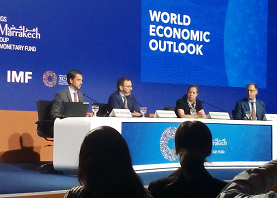By Andualem Sisay Gessesse – Marrakech, Morocco – The World Economic Outlook launched today by the International Monetary Fund (IMF) in Marrakech, Morrocco says the anticipated decline of China’s economic growth in 2024 is likely to result in slow growth of Sub-Saharan African countries and other close trading partners with the second largest economy.
The report estimated that in 2023 China economy will grow by 5 percent in 2023 and slows to 4.3 percent next year. When China’s economy declines by 1 percentage point, the economy of Sub-Saharan countries and the rest of the world is expected to slow by 0.3 percentage.
The report also stated that in sub-Saharan Africa, growth is projected to decline to 3.3 percent in 2023 before picking up to 4.0 percent in 2024, with 0.2 percentage point and 0.1 percentage point downward revisions for 2023 and 2024, respectively, and with growth remaining below the historical average of 4.8 percent. The projected decline reflects, in a number of cases, worsening weather shocks, the global slowdown, and domestic supply issues, including, notably, in the electricity sector.
“The slowdown in China is a big part of the story. This has a spillover on the rest of the world…One percent decrease of China’s economy results in 0.3 percent economic slowdown in the rest of the world…But it is not uniform in the rest of the world,” said Pierre-Olivier Gourinchas, Economic Counsellor and the Director of Research of the IMF.
Some of them could be trading partners could be in Africa mainly commodity exporters which can be affected by this slow growth of China. The real estate crisis is among the major reasons for the anticipated Chinese economic growth slowdown, according to the report along with his colleagues. The report stated that China’s property sector crisis could deepen, with global spillovers, particularly for commodity exporters.
“Elsewhere, near-term inflation expectations have risen and could contribute—along with tight labor markets––to core inflation pressures persisting and requiring higher policy rates than expected. More climate and geopolitical shocks could cause additional food and energy price spikes,” the report stated.
“The real estate crisis could deepen further in China, an important risk for the global economy. The policy challenge is complex. Restoring confidence requires promptly restructuring struggling property developers, preserving financial stability, and addressing the strains in local public finance,” the report said.
“If real estate prices decline too rapidly, the balance sheets of banks and households will worsen, with the potential for serious financial amplification. If real estate prices are artificially propped up, balance sheets will be protected for a while, but this may crowd out other investment opportunities, reduce new construction activity, and have an adverse impact on local government revenues through reduced land sales. Either way, China’s economy needs to pivot away from a credit driven real estate model of growth,” the report said.
Inflation of 1.6 percent in China will result in the inflation of 0.6 percent in the rest of the world according to Pierre-Olivier Gourinchas, who briefed journalists about the findings of the report.
Global inflation is forecast to decline steadily, from 8.7 percent in 2022 to 6.9 percent in 2023 and 5.8 percent in 2024. But the forecasts for 2023 and 2024 are revised up by 0.1 percentage point and 0.6 percentage point, respectively, and inflation is not expected to return to target until 2025 in most cases.
The report stated that in sub-Saharan Africa, growth is projected to decline to 3.3 percent in 2023 before picking up to 4.0 percent in 2024, with 0.2 percentage point and 0.1 percentage point downward revisions for 2023 and 2024, respectively, and with growth remaining below the historical average of 4.8 percent. The projected decline reflects, in a number of cases, worsening weather shocks, the global slowdown, and domestic supply issues, including, notably, in the electricity sector.

